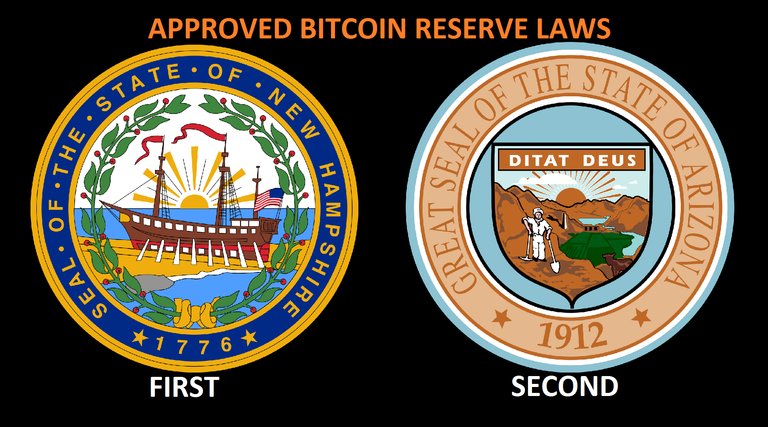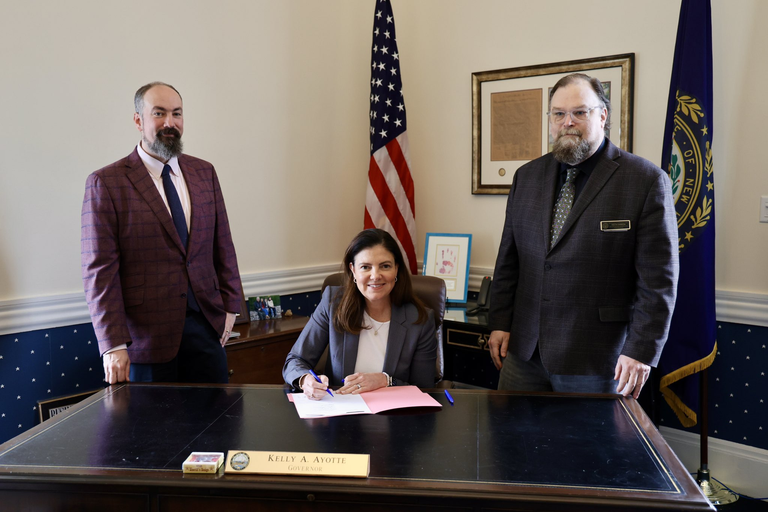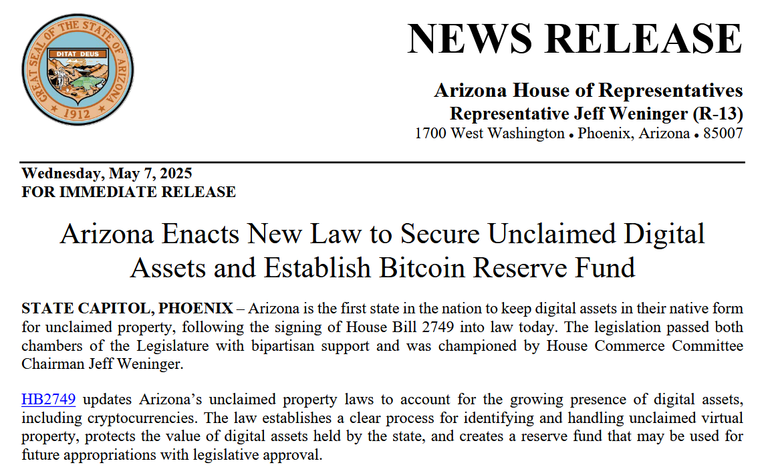New Hampshire and Arizona Blaze Trail for U.S. Bitcoin Reserves
KEY FACTS: In May 2025, New Hampshire and Arizona became the first U.S. states to establish Bitcoin reserves, with New Hampshire’s House Bill 302, signed on May 6, authorizing up to 5% of public funds to be invested in Bitcoin, and Arizona’s House Bill 2749, signed on May 7, creating a reserve fund to hold unclaimed digital assets like Bitcoin and Ethereum in their native form. New Hampshire’s law, restricting investments to assets with a $500 billion market cap, positions it as a bold pioneer, while Arizona’s cautious approach avoids public fund investments, focusing on assets from seizures or unclaimed property. Both laws, inspired by President Trump’s federal Bitcoin reserve initiative, reflect contrasting strategies amid a national push for crypto adoption.

Source: The Seal of New Hampshire and Arizona
New Hampshire and Arizona Blaze Trail for U.S. Bitcoin Reserves
It has been a transformative week for cryptocurrency adoption in the United States, as New Hampshire and Arizona have emerged as pioneers in establishing state-level Bitcoin reserves, with both states enacting landmark legislation in early May 2025. On May 6, New Hampshire became the first state to sign House Bill 302 (HB 302) into law, allowing its treasurer to allocate up to 5% of public funds to Bitcoin, while Arizona followed suit on May 7, with Governor Katie Hobbs signing House Bill 2749 (HB 2749) to create a Bitcoin Reserve Fund for unclaimed digital assets.
New Hampshire is once again First in the Nation! 🎉
Just signed a new law allowing our state to invest in cryptocurrency and precious metals.
Source
NEWS RELEASE
Arizona House of Representatives
Representative Jeff Weninger (R-13)
Arizona Enacts New Law to Secure Unclaimed Digital
Assets and Establish Bitcoin Reserve Fund
Source
These moves, which position the two states at the forefront of a growing national movement to integrate digital currencies into public finance, have ignited excitement among crypto advocates, sparked debates over financial risk, and set the stage for other states to follow. As the U.S. grapples with the role of cryptocurrencies in its economy, New Hampshire’s bold investment strategy and Arizona’s cautious approach to unclaimed assets offer contrasting yet complementary models for embracing the digital asset revolution.
New Hampshire’s Pioneering Leap
New Hampshire’s HB 302, signed by Governor Kelly Ayotte on May 6, 2025, marks a historic milestone as the first U.S. state law to authorize direct investment in Bitcoin for state reserves. The legislation permits the state treasurer to allocate up to 5% of public funds to digital assets with a market capitalization exceeding $500 billion, a threshold currently met only by Bitcoin, with a market cap of approximately $1.87 trillion. Championed by Representative Keith Ammon and Majority Leader Jason Osborne, and modeled after a policy framework from the Satoshi Action Fund, the law allows New Hampshire to purchase Bitcoin directly or through regulated exchange-traded products (ETPs), with assets held in secure U.S.-regulated custody arrangements.

Signing New Hampshire’s crypto reserve bill into law on May 6. Source: Governor Kelly Ayotte
The road to HB 302 was paved with years of advocacy, dating back to 2016 when Ammon proposed accepting Bitcoin for tax payments, a bill that ultimately failed. The recent surge in mainstream crypto acceptance, bolstered by President Donald Trump’s March 2025 executive order establishing a federal Strategic Bitcoin Reserve, provided the momentum needed to pass HB 302. The Satoshi Action Fund, led by CEO Dennis Porter, played a pivotal role, drafting the model legislation and supporting six pro-Bitcoin state laws nationwide. The law’s fiscal guardrails, including the 5% cap and market cap requirement, aim to balance innovation with prudence, though critics like State Senator Donovan Fenton warn that Bitcoin’s volatility could expose taxpayers to losses.
Arizona’s Pragmatic Approach
Just one day after New Hampshire’s milestone, Arizona solidified its place in the crypto landscape with the signing of HB 2749 by Governor Katie Hobbs on May 7, 2025. The “Unclaimed Digital Assets & Bitcoin Reserve Fund” bill establishes a framework for the state to hold unclaimed cryptocurrencies, such as Bitcoin, Ethereum, airdrops, and staking rewards, in their native form without converting them to fiat currency. Unlike New Hampshire’s proactive investment strategy, Arizona’s law focuses solely on managing digital assets already acquired through seizures or unclaimed property programs, avoiding the risks of investing public funds. The legislation, sponsored by Representative Jeff Weninger and supported by Senator Wendy Rogers, exempts the reserve fund from fiscal year lapse rules, allowing Arizona to retain these assets indefinitely and potentially benefit from long-term price appreciation.

Arizona House Representative Jeff Weninger’s statement on the signing of HB 2749 into law. Source: Jeff Weninger
Arizona’s path to HB 2749 was marked by political contention. Earlier in 2025, the state legislature passed two ambitious bills—SB 1025 and SB 1373—proposing to allocate up to 10% of public funds, including retirement system assets, to Bitcoin. However, Hobbs vetoed SB 1025 on May 2, citing concerns over the volatility of “untested assets,” drawing criticism from crypto advocates like Anthony Pompliano, who called the veto an example of “ignorance.” HB 2749 emerged as a compromise, addressing Hobbs’ risk concerns while advancing Arizona’s role in the digital economy. The law’s focus on secure custody protocols and unclaimed assets has been praised as a pragmatic step, though some Bitcoin maximalists argue it falls short of the bolder vision proposed in earlier bills.
A National Movement Gains Momentum
The back-to-back passage of HB 302 and HB 2749 comes amid a competitive race among U.S. states to establish crypto reserves, spurred by Trump’s federal Bitcoin reserve initiative and the International Monetary Fund’s recognition of digital assets as part of the global financial system. New Hampshire and Arizona’s successes stand in contrast to setbacks in other states. Florida withdrew its Bitcoin reserve proposal (HB 487), while Montana, Wyoming, North Dakota, Pennsylvania, and Oklahoma saw similar bills stall. North Carolina, however, is moving forward with its Digital Assets Investment Act, which would allow up to 5% of certain funds to be allocated to cryptocurrencies, pending Senate approval. Proposals in Texas and Alabama are also gaining traction, suggesting that New Hampshire and Arizona’s actions could inspire a broader wave of adoption.
The two states’ approaches show distinct philosophies. New Hampshire’s proactive investment in Bitcoin aligns with its libertarian ethos and “Live Free or Die” spirit, positioning it as a test case for integrating digital assets into public finance. Arizona’s focus on unclaimed assets offers a more conservative model, mitigating financial risk while still embracing crypto’s potential. “New Hampshire didn’t just pass a bill; it sparked a movement,” Porter said, while Weninger noted, “Arizona’s Bitcoin Reserve Fund is a proof of concept that will show the world what’s possible.” Together, these laws demonstrate the diverse strategies states are employing to navigate the evolving crypto landscape.
Crypto advocates also express mixed sentiments. While New Hampshire’s bold move has been widely celebrated, some argue that Arizona’s law is too cautious, missing an opportunity to lead with active investments. Bitcoin’s price, which stabilized near $97,800 after Arizona’s signing, remains sensitive to broader market factors, including the Federal Reserve’s recent $20.5 billion Treasury bond purchase, highlighting the uncertainty surrounding state-level adoption.
The crypto community has responded with a mix of celebration and cautious optimism. New Hampshire’s law, in particular, has been hailed as a game-changer. Arizona’s law, while less ambitious, has been praised for setting a precedent for managing abandoned digital currencies.
As New Hampshire and Arizona prepare to implement their respective Bitcoin reserves, both face the daunting task of developing secure custody infrastructure and ensuring regulatory compliance. New Hampshire’s 60-day implementation period means it will not begin purchasing Bitcoin immediately, while Arizona must establish protocols to manage unclaimed assets effectively. The success of these initiatives could serve as a blueprint for other states and could likely accelerate Bitcoin’s integration into public finance nationwide.
Without a doubt, New Hampshire and Arizona have set a powerful precedent, each in its own way. New Hampshire’s bold investment strategy signals a future where digital assets are a core component of state treasuries, while Arizona’s cautious approach demonstrates that even risk-averse states can embrace crypto’s potential. As the U.S. navigates this uncharted territory, the actions of these two states may prove to be defining moments in the mainstream adoption of Bitcoin.
Information Sources:
- Governor Kelly Ayotte/ X
- Arizona legislation
- Jeff Weninger
- Arizona legislation - PDF
- Cointelegraph
- Cointelegraph

If you found the article interesting or helpful, please hit the upvote button and share for visibility to other hive friends to see. More importantly, drop a comment below. Thank you!
This post was created via INLEO. What is INLEO?
INLEO's mission is to build a sustainable creator economy that is centered around digital ownership, tokenization, and communities. It's built on Hive, with linkages to BSC, ETH, and Polygon blockchains. The flagship application, Inleo.io, allows users and creators to engage & share micro and long-form content on the Hive blockchain while earning cryptocurrency rewards.
Let's Connect
Hive: inleo.io/profile/uyobong/blog
Twitter: https://twitter.com/Uyobong3
Discord: uyobong#5966
Posted Using INLEO
https://www.reddit.com/r/Libertarian/comments/1khv188/new_hampshire_and_arizona_blaze_trail_for_us/
https://www.reddit.com/r/Libertyinourlifetime/comments/1kitts2/new_hampshire_and_arizona_blaze_trail_for_us/
This post has been shared on Reddit by @tsnaks through the HivePosh initiative.